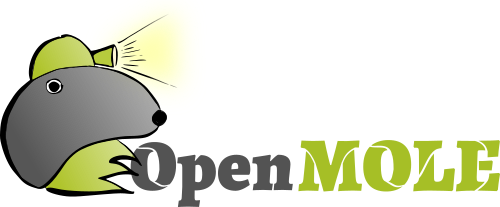You can program your data processing tasks using the
ScalaTask. For instance the following
workflow sums all the elements of an array using a ScalaTask and displays the results. To get more
details on the hook part you can check the doc on hooks.
val array = Val[Array[Double]]
val result = Val[Double]
val sum = ScalaTask("val result = array.sum") set (
inputs += array,
outputs += result,
array := Array(8.0, 9.0, 10.0)
)
(sum hook ToStringHook())val element = Val[Double]
val multiplied = Val[Double]
val result = Val[Double]
val expensive = ScalaTask("val multiplied = element * 2") set (
inputs += element,
outputs += multiplied
)
val exploration = ExplorationTask(element in List(8.0, 9.0, 10.0))
val sum = ScalaTask("val result = multiplied.sum") set (
inputs += multiplied.toArray,
outputs += result
)
exploration -< expensive >- (sum hook ToStringHook())
OpenMOLE makes it simple to include your own Java code in a workflow. A Java program can be encapsulated in a task of
a workflow. The task should be a ScalaTask and the Java program should be packaged as a JAR archive passed to the
ScalaTask through the
libraries parameter.
Let us consider the simple code Hello.java in a directory named hello (to respect Java's package structure):
package hello;
public class Hello {
public static void run(int arg) {
System.out.println("Hello from Java! " + arg);
}
}mkdir hello
mv Hello.java hello
cd hello
javac Hello.java
cd ..
jar cvf Hello.jar helloval proto1 = Val[Int]
val explo = ExplorationTask(proto1 in (0 until 10))
//Defines the task to perform the hello function
val javaTask = ScalaTask("hello.Hello.run(proto1)") set (
libraries += workDirectory / "Hello.jar",
inputs += proto1
)
explo -< javaTaskHello from Java! 0
Hello from Java! 1
Hello from Java! 2
Hello from Java! 3
Hello from Java! 4
Hello from Java! 5
Hello from Java! 6
Hello from Java! 7
Hello from Java! 8
Hello from Java! 9
Hello from Java! 10package hello;
public class Hello {
public static double[] run(double arg1, double arg2) {
return double[]{arg1 * 10, arg2 * 10};
}
}val arg1 = Val[Double]
val arg2 = Val[Double]
val out1 = Val[Double]
val out2 = Val[Double]
val explo = ExplorationTask(
(arg1 in (0.0 to 10.0 by 1.0)) x
(arg2 in (0.0 until 10.0 by 1.0))
)
val javaTask = ScalaTask("hello.Array(out1, out2) = Hello.run(arg1, arg2)") set (
libraries += workDirectory / "Hello.jar",
inputs += (arg1, arg2),
outputs += (arg1, arg2, out1, out2)
)
// save the result in a CSV file
val csvHook = AppendToCSVFileHook(workDirectory / "result.csv")
explo -< (javaTask hook csvHook)package hello;
import java.io.*;
public class Hello {
public static void run(int arg, File input, File output) throws IOException {
//Read the input file
String content = readFileAsString(input);
PrintStream myStream = new PrintStream(new FileOutputStream(output));
try {
myStream.println(content + " " + arg);
} finally {
myStream.close();
}
}
private static String readFileAsString(File file) throws IOException {
byte[] buffer = new byte[(int) file.length()];
BufferedInputStream f = null;
try {
f = new BufferedInputStream(new FileInputStream(file));
f.read(buffer);
} finally {
if (f != null) try { f.close(); } catch (IOException ignored) { }
}
return new String(buffer);
}
}val proto1 = Val[Int]
val inputFile = Val[File]
val outputFile = Val[File]
val explo = ExplorationTask(proto1 in (0 to 10))
//Defines the scala task as a launcher of the hello executable
val javaTask =
ScalaTask("val outputFile = newFile(); hello.Hello.run(proto1, inputFile, outputFile)") set (
libraries += workDirectory / "Hello.jar",
inputs += (proto1, inputFile),
outputs += (proto1, outputFile),
inputFile := workDirectory / "input.txt"
)
//Save the output file locally
val copyHook =
CopyFileHook(
outputFile,
workDirectory / "out-${proto1}.txt"
)
explo -< (javaTask hook copyHook)| previous | up | next |
